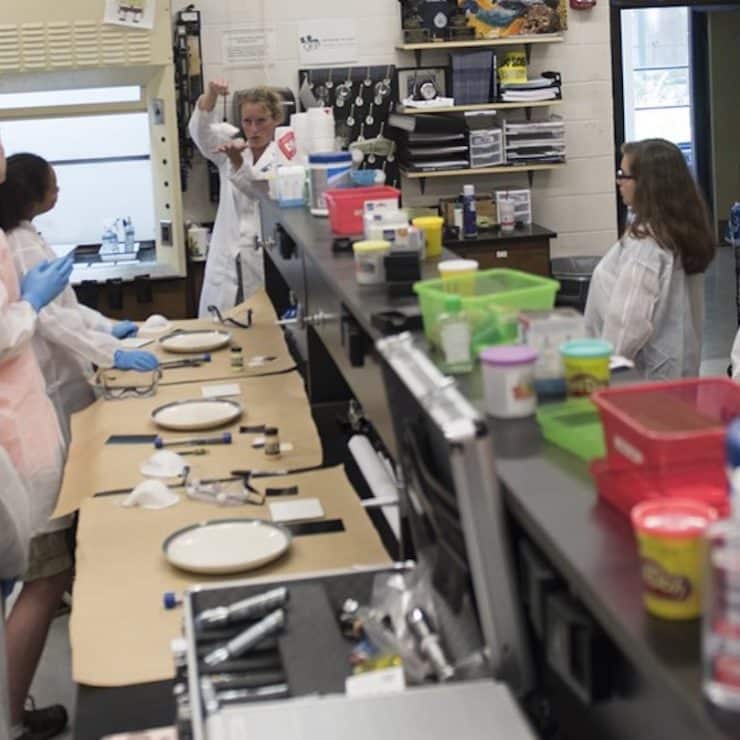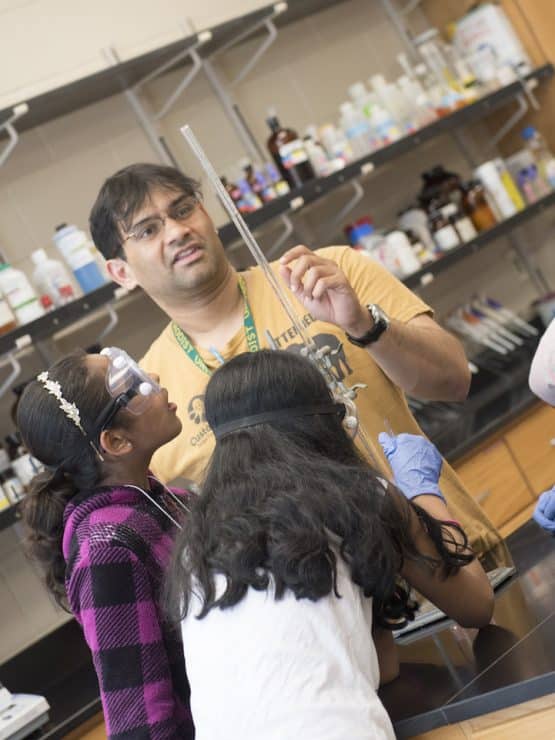
Forensic Science (Chemistry)
The Forensic Science program at Methodist University is geared towards students interested in pursuing a career in criminal forensic analysis. Criminalists use scientific methods and procedures, such as DNA analysis, chromatography, and infrared resonance imaging, to analyze evidence in criminal investigations. Our cross-curriculum program is strengthened by the collaboration of several departments, including chemistry and physical science, biology, and justice studies. This full spectrum approach prepares our graduates for entry into this fast-growing field.
Common Salary Ranges for Graduates
The U.S. Bureau of Labor Statistics reports the average annual salary for forensic science technicians in North Carolina in 2021 to be $50,980.
Average Tuition Cost
The average cost for an incoming residential freshman to attend MU is less than $18,000 – similar to the cost of attending one of the big-box public schools, but with the enhanced value of a highly-regarded private school with a 12:1 student-to-faculty ratio.
While tuition varies, depending on a student’s financial aid package, it’s important to know that the average financial award for an incoming residential freshman at MU is more than $34,000.
Financial Aid & Scholarships
More than 97% of MU students receive some form of financial aid, with the University offering more than $24 million annually to students for scholarships. If a student is active military, family of active military, or a veteran, they may also qualify for MU’s military education benefits.
Interested in Methodist University’s Forensic Science (Chemistry) concentration?
If you have questions, see the FAQ below or reach out to Dr. Stephanie Hooper Marosek at her contact info at the bottom of the page. If you’re ready to apply today, click the button below!
Frequently Asked Questions
Forensic science technicians typically need at least a bachelor’s degree. On-the-job training is typically required, both for those who investigate crime scenes and for those who work in labs.
According to industry experts, forensic science technicians typically need at least a bachelor’s degree in a field such as physical science, biology, or forensic science. Fortunately, Methodist University’s forensic science program prepares you for a long and successful career.
Major Requirements
The Chemistry major with a concentration in Forensic Science consists of 77-78 credits distributed as follows:
Required Core Courses
37-38 credits
| CHE 1510/1511 General Chemistry I with Lab (4) | CHE 3520 Instrumental Analysis (4) |
| CHE 1520/1521 General Chemistry II with Lab (4) | CHE 4210 Thermodynamics and Kinetics (4) or CHE 4220 Quantum Mechanics and Spectroscopy (4) |
| CHE 2210/2211 Organic Chemistry I with Lab (4) | CHE 4860 Library Research Project (1) or CHE 4870 Laboratory Research Project (2) |
| CHE 2220/2221 Organic Chemistry II with Lab (4) | PHY 1510 General Physics I (4) or PHY 2510 General Physics I-Calculus Based (4) |
| CHE 3510 Quantitative Analysis (4) | PHY 1520 General Physics II (4) or PHY 2520 General Physics II-Calculus Based (4) |
Required Forensic Science Concentration Courses
8 credits
| CHE 4100 Forensic Chemistry (4) | CHE 4500 Biochemistry (4) |
Forensic Science Concentration Electives
4 credits
Select one course from the following list:
| CHE 2300 Basic Environmental Chemistry (4) | CHE 4220 Quantum Mechanics and Spectroscopy (4) |
| CHE 3100 Inorganic Chemistry (4) | CHE 4600 Advanced Biochemistry (4) |
| CHE 4000 Medicinal Chemistry (4) |
Required Forensic Science Biology Courses
8 credits
| BIO 1530/1531 Fundamentals of Biology I with Lab (4) | BIO 2970 General Microbiology (4) or BIO 3960 Molecular Genetics (3) |
Required Forensic Science Justice Courses
9 credits
| JUS 2420 Introduction to Forensic Science (3) | JUS 3090 Criminology (3) or JUS 4010 The Investigative Process (3) |
| JUS 3970 Crime Scene Investigation (3) |
Required Mathematics Courses
11 credits
| MAT 2200 Applied Statistics (3) | MAT 2420 Calculus II (4) |
| MAT 2410 Calculus I (4) |
Contact
Stephanie Hooper Marosek, Ph.D.

